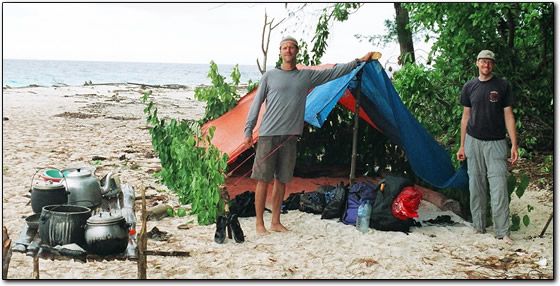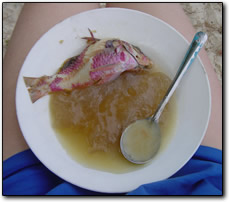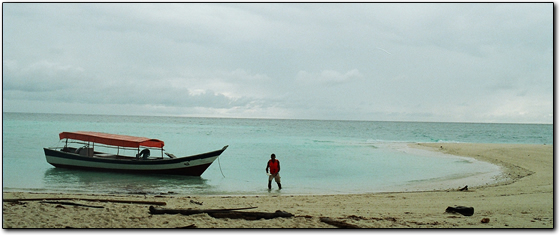
Wairondi Island
We set out for an isolated island known for its turtles. On the way we had to “report” to another village. Eric went to find the village chief, sit in his hut and make polite small talk while we informed him of our plans. The boys bought some fresh supplies and refilled our water. Later, in the open sea, we spotted a pod of dolphins and turned to chase them. Soon dolphins were racing alongside the boat, leaping in front of the bow and carousing in the water. Dan, excited by a swim with the dolphins, jumped into the water with his mask and snorkel. The dolphins immediately disappeared. One of our engines died and Heine tinkered with it for a long time, finally concluding that there was nothing he could do at sea. It took several hours to get to our destination on one engine. By the time we arrived, the afternoon wind had kicked up the surf, making snorkeling impossible. We huddled under the trees to avoid the wind and light rain. With the crew we built a small camp in white sand from sticks and plastic sheets.
 |
 |
In the evening, the wind calmed and the rain stopped. We boiled water in the biggest pot to cook the lobster. Dan, estimating the weight, calculated how much time it would take to cook it just right. Two of the lobsters had already died. They were easy to get in the pot. Once cooked, we cracked them open and feasted on the succulent meat. The last lobster, still living, didn’t want to go in the boiling water. Its exoskeleton was covered with sharp spines. One flinch could cut or puncture our skin. Albert helped us to push it into the boiling pot face-first, killing it immediately. Stuffed with lobster, we took a walk on the white sand in the moonlight, listening to the surf and the wind blowing in the trees.
We spent the next day snorkeling around the island. Reef bombing had destroyed most of the coral. One area, still in decent condition, was a little too deep to snorkel. Eric, floating away from the boat with the current, dove down to look under a large coral fan and saw a pair of waving long legs. It was a big rock lobster. He called the others over to try to catch it, but they only succeeded in driving it into hiding. In the afternoon Eric went fish hunting with Hendrik. He was good at creeping up on the reef fish with his spear gun. With each freshly speared fish, Eric threaded a string through its gills and hung it from his waist, hoping that the sharks weren’t interested! For dinner, the crew prepared sago, the beaten pulp of a variety of wild palm. They insisted that the sago be eaten with fish. Although it tasted like bland, tasteless jello, it did complement the freshly grilled fish.
 |
The next day, our second motor still defective, we returned to Ransiki. We tried snorkeling in several areas near town, but the reefs were completely bombed out. After unloading, we paid for the boat and gave everyone a big tip. They had been great companions, helpful, generous and cheerful. On the way back to town we stopped at the park office to talk to the staff about the reef conditions. The ranger we met admitted that there was a lot of damage, much of it caused by the local inhabitants (and not outsiders, as the boys had insisted.) Eric asked how often they patrolled the area. In addition to “regular” police and army patrols, the park rangers went out once or twice a year. No wonder there was so much damage! Sadly, the situation is typical for Indonesia. Perhaps developing the park for tourism could improve enforcement and teach the inhabitants the value of preserving their underwater environment.
 |
